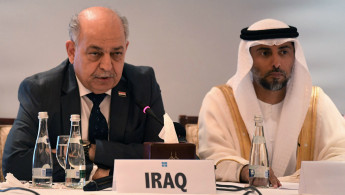Oil producers pledge to respect cuts as market sags
OPEC kingpin Saudi Arabia led calls to abide by promises on production curbs that the cartel hopes will drive up prices - with some including Nigeria and Iraq accused of exceeding their quotas.
"Every country should live up to its commitments," new Saudi Energy Minister Prince Abdulaziz bin Salman said as a committee of producers charged with monitoring the cuts and assessing the oil market held talks in Abu Dhabi.
Prince Abdulaziz said the wider OPEC+ alliance which includes Russia is prepared to act to protect the market if sanctions-hit Iran, also a member of the group, returns to the market.
He told the Joint Ministerial Monitoring Committee (JMMC) meeting that it was imperative to restore stability in the oil market, where prices have slumped to below $60 a barrel.
Twitter Post
|
Dubbed OPEC+, the 24-member alliance of cartel and non-cartel producers decided last year to cut output by 1.2 million barrels per day (bpd) from January 2019, to boost prices after they fell by more thaREFILn 40 percent.
The cuts were extended by nine months until the end of March 2020 but that failed to invigorate the market, and observers believe the usual levers to control prices seem to be having little effect.
However, host nation United Arab Emirates (UAE) pledged Thursday to further cut its output by October and Iraq and Nigeria said it will withdraw a total of 230,000 barrels per day (bpd).
"We reiterate our firm commitment to full compliance," Iraqi Oil Minister Thamer al-Ghadban told a press conference. "September export levels will be significantly lower than August and there will be deeper cuts in October."
Saudi Arabia, which has been shouldering the burden of existing production cuts, will continue to reduce its oil production "at a rate exceeding the quota agreed through OPEC+", Prince Abdulaziz said.
Subdued outlook
The oil market has been hit by fears that global demand will be dented by the US-China trade war and the slowdown in world economy.
UAE Energy Minister Suheil al-Mazrouei said on Sunday that the group will do whatever necessary to stabilise the market, and that further production cuts could be considered.
However, he admitted the issue was not entirely in the hands of the world's top producers, with the market no longer governed by supply but being influenced more by the prolonged row between Beijing and Washington and other geopolitical factors.
"The market is giving up on OPEC+ being able to support the price," Ole Hansen, head of commodities strategy at Saxo Bank A/S told Bloomberg News as prices sagged again Thursday.
"They can control production but not demand."
There was no good news from the latest International Energy Agency (IEA) monthly report, which said growth in global demand for oil is expected to remain subdued.
"International trade relations have further deteriorated in the past few weeks," the Paris-based IEA said, although US and Chinese officials have announced they would resume trade negotiations in early October.
"Trade disputes and rising uncertainty about the impact of the UK’s possible exit from the European Union are reducing global growth through lower business and consumer confidence, supply chain re-assessments, declining investment and direct reduction of trade," it said.
Against the uncertain backdrop, the IEA left its oil demand growth forecasts for 2019 and 2020, lowered in its previous monthly report, unchanged at 1.1 million barrels per day and 1.3 million bpd.
The JMMC does not take decisions but makes recommendations for action which will be considered by the full OPEC+ ministerial meeting in December.
Veteran official Khalid al-Falih was replaced earlier this month as Saudi oil minister as the top crude exporter accelerates preparations for the much-anticipated IPO of its energy giant Aramco.
A son of King Salman, and half-brother to de facto ruler Crown Prince Mohammed bin Salman, he is the first member of the royal family ever put in charge of the kingdom's all-important energy ministry.
Follow us on Twitter: @The_NewArab
More In News





 Follow the Middle East's top stories in English at The New Arab on Google News
Follow the Middle East's top stories in English at The New Arab on Google News
![Israeli forces ordered bombed Gaza's Jabalia, ordering residents to leave [Getty]](/sites/default/files/styles/image_330x185/public/2176418030.jpeg?h=a5f2f23a&itok=_YGZaP1z)

